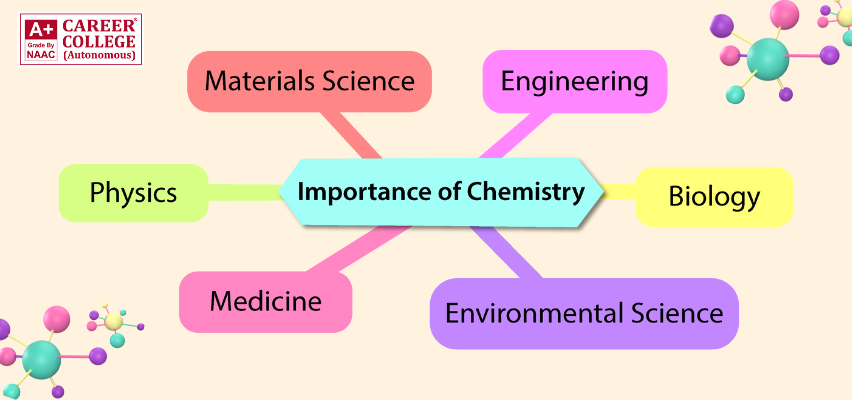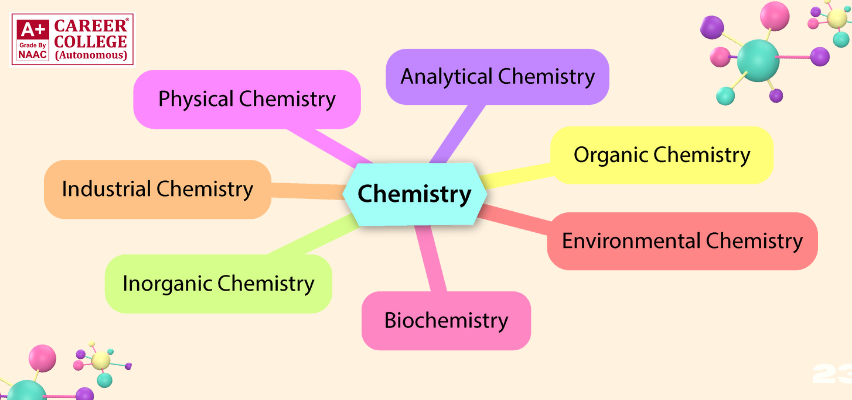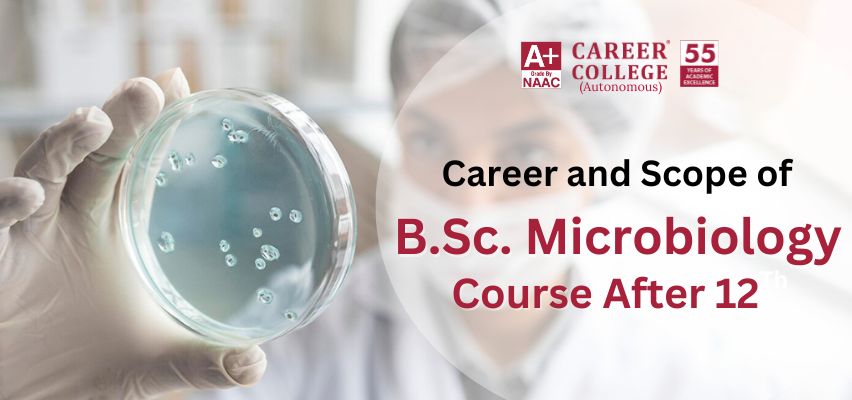Table of Contents
ToggleThe Ultimate Scope of BSc Chemistry Course in 2025-26
BSc Chemistry: The Bachelor of Science in Chemistry, also known as the root of science and technology, acts as a bridge between different fields of science and technology. It is the study of a subject, including its properties, how it is linked with other subjects, and the changes it goes through. For students who have passed 12th grade, BSc chemistry provides numerous career opportunities and possibilities. This blog analyzes the importance of chemistry and its relationship to other fields of science and technology, various branches and fields of chemistry, undergraduate and postgraduate courses, career opportunities, salary packages, and the best college in Bhopal for BSc Chemistry, such as Career College (Autonomous) in Bhopal.
Quick View
|
Headings |
Sub-topics |
|---|---|
|
Introduction |
The importance of chemistry |
|
The Importance of Chemistry |
Interlinking science and technology |
|
Branches of Chemistry |
Organic, inorganic, physical, analytical, biochemistry, environmental, and industrial |
|
Undergraduate Courses |
B.Sc. Chemistry, B.Sc. (Hons.) Chemistry |
|
Postgraduate Courses |
M.Sc. Chemistry, M.Sc. Biochemistry, Ph.D. in Chemistry |
|
BSc Chemistry Subjects |
Organic, inorganic, physical, analytical chemistry, biochemistry, environmental |
|
BSc Chemistry Scope |
In 2025, a BSc Chemistry course will have a wide and promising scope |
|
BSc Chemistry Jobs |
Pharmaceuticals, chemical industry, academia, environmental science, healthcare |
|
Best College in Bhopal for BSc Chemistry |
Career College, Bhopal |
|
Conclusion |
Summary and Future Prospects |
|
FAQs |
Common questions about pursuing a B.Sc. Chemistry |
The Importance of Chemistry in Multiple Fields
Chemistry links to multiple fields of science and technology, making major contributions development and innovation:

Biology
Biochemistry is a branch of chemistry that deals with the chemical reactions within and between living organisms. It applies biology and chemistry ideas to better understand and change biological processes. This interconnectedness is important in genetics, molecular biology, and pharmaceutical research.
Physics
Physical chemistry is the study of how matter behaves at the molecular level and atomic levels, and how chemical reactions occur, it bridges the gap between physics and chemistry, helping to develop quantum mechanisms and thermodynamics.
Environmental Science
Environmental chemistry is the study of chemical and biological processes that occur in nature. It is essential to understand pollution, and degradation of the environment, and create sustainable technology. The field of chemistry contributes to the development of strategies for solving the environmental issue and promoting sustainability.
Engineering
Chemical engineering is the efficient use, production, transformation, and transportation of chemicals, materials, and energy using concepts from chemistry, physics, mathematics, biology, and economics. It plays an important role in the manufacturing and production sectors, helping to create new materials and technologies.
Medicine
Medicinal chemistry is a subject that combines chemistry, pharmacology, and other branches of biology to study the design, synthesis, and development of pharmacological drugs. This field is critical for the development of new drugs and treatment techniques.
Materials Science
Chemistry is essential in material science, which studies material characteristics and applications. It covers the creation of new materials for industries and technology, such as ceramics, polymers, and nanomaterials.
Branches of Chemistry
The following primary branches of chemistry are: physical chemistry, biochemistry, organic chemistry, inorganic chemistry, analytical chemistry, environmental chemistry, and industrial chemistry:

Organic Chemistry
This study of carbon-based compounds, including properties, reactivity, and synthesis. Organic chemistry is essential for the production of drugs, polymers, and other synthetic materials.
Inorganic Chemistry
The focus is on organic substances, especially those that don’t have carbon-hydrogen bonds, such as metal and materials. Inorganic chemistry is essential in industries such as metallurgy and catalyst development.
Analytical Chemistry
Analyze materials to identify the composition and amount of each type of component. This section is critical for quality control in manufacturing and environmental monitoring.
Physical Chemistry
Study the physical characteristics of molecules, the forces acting on them, and their responses. To understand matter behavior, it integrates physics and chemistry concepts.
Biochemistry
Examines the chemical reactions that take place inside and around the living organism’s body. Biochemistry is essential for understanding biological processes and the molecular roots of diseases.
Environmental Chemistry
Analyzes the chemical and biochemical processes that happen in the environment. This field is important for solving problems such as climate change and air pollution.
Industrial Chemistry
It applies knowledge of chemicals to industrial operations, such as those involved in the production of materials, chemicals, and final goods. New materials and technologies are developed with the help of industrial chemistry.
Chemistry Undergraduate Courses
BSc Chemistry
A 3-year undergraduate curriculum that provides basic knowledge in various fields of chemistry. Students get a solid understanding of fundamental chemistry concepts and laboratory techniques.
BSc (Hons with research) Chemistry
After completing a 3-year undergraduate course, you can pursue honors in chemistry, which focuses on research and practical knowledge while providing an advanced understanding of chemistry. This course will prepare students for higher education and research professions.
Postgraduate & Doctoral Courses after BSc Chemistry
MSc Chemistry
It is a two-year curriculum that focuses on advanced chemistry, research methodology, and specialized subjects. This course is suitable for those who are interested in research and the academic profession.
MSc Biochemistry
It focuses on the study of chemical reactions that occur within living organisms. Students who complete this course are prepared for positions in the pharmaceutical and biomedical industries.
PhD in Chemistry
Research-intensive curriculum leading to a PhD, ideal for those student who are interested in research and academic profession. PhD candidates perform innovative research that advances chemical science, with some more options: PhD in Applied Chemistry and PhD in Biochemistry.
BSc Chemistry Subjects
- Physical chemistry
- Inorganic chemistry
- Analytical Chemistry
- Chemistry
- Polymer chemistry
- Environmental science
- Molecular spectroscopy
- Spectroscopic methods
- Stereochemistry
- Thermodynamics
- Organic Chemistry
- Application of computer in chemistry
BSc Chemistry Scope
BSc Chemistry Scope In 2025, it will have a wide scope. The demand for qualified chemists is growing in several industries, including pharmaceuticals, environmental science, and material engineering. Graduates have different options to consider. Like quality assurance, laboratory management, and research and development. A bachelor’s degree in Chemistry provides a strong foundation and multiple career opportunities.
BSc Chemistry Jobs
- Chemical technologist
- Chemist
- Laboratory Technician
- Analytical chemist
- Petrochemicals
- Biochemistry
- Forensic scientist
- Pharma assistant
- Teacher
- Toxicologist
- Environmental science
- Laboratories
- Pharmaceutical industry
- Professor
- Research Associate
- Chemical Safety Officer
- Food industry
- Research Institute
- Researcher
- Agrochemicals
- Biochemist
- Clinical Research Specialist
- Material Science
BSc Chemistry Salary
Level | Salary Range | Description |
|---|---|---|
Entry-Level | ₹3,00,000 to ₹5,00,000 per annum | Entry-level positions offer a good starting salary for chemistry graduates. |
Mid-Level | ₹5,00,000 to ₹10,00,000 per annum | Mid-level positions provide opportunities for career advancement and higher earnings. |
Senior-Level | ₹10,00,000 to ₹20,00,000 per annum or higher | Senior-level positions offer significant earning potential and leadership roles, depending on experience and specialization. |
Best College in Bhopal for BSc Chemistry
Career College, Bhopal
Career College Bhopal, with its Autonomous status, is well-known for having a comprehensive BSc Chemistry course, qualified faculty, and modern facilities. Awarded by India Today for BSc course as the 1st best college in Madhya Pradesh in 2025. The college provides Undergraduate (U.G.) and Postgraduate (P.G.) courses in chemistry with a research center approved by Barkatullah University Bhopal. Focusing on academic understanding and practical application. It places a special focus on research and development. Prepares students for a wide range of employment opportunities in chemistry and related fields. Prospective students and their guardians are most welcome to visit the Career College Bhopal campus and our official website, https://careercollegeindia.com/ to learn more about BSc Chemistry and the admission process.
Conclusion
The development of science and technology depends on chemistry the foundation of science. After 12th grade, it provides students with a wide range of options, with multiple fields and specialties leading to fulfilling jobs. By pursuing Undergraduate and postgraduate studies, students can access a wide range of companies and sectors with a strong foundation in chemistry. Career College (Autonomous) is the Best college in Bhopal for BSc Chemistry it offers exceptional learning opportunities so that graduates are prepared to meet the needs of today’s scientific and technical world. Choosing a profession in chemistry not only ensures a bright future but also makes a major contribution to the development of science and technology.
Frequently Asked Questions [FAQs]
Q1: What is the BSc Chemistry scope?
Answer: There are numerous scopes in fields like pharmaceuticals, chemical industry, academia, environmental science, healthcare, and material science.
Q2: What is the BSc Chemistry salary?
Answer: Entry-level positions offer ₹3,00,000 to ₹5,00,000 per annum, mid-level positions range from ₹5,00,000 to ₹10,00,000, and senior-level positions can go up to ₹20,00,000 or higher.
Q3: What BSc Chemistry subjects?
Answer: Subjects include organic chemistry, inorganic chemistry, physical chemistry, analytical chemistry, biochemistry, and environmental chemistry.
Q4: What is the importance of chemistry in other scientific fields?
Answer: Chemistry interlinks with biology, physics, environmental science, engineering, medicine, and materials science, contributing to advancements in these areas.
Q5: After BSc Chemistry, which course is best?
Answer: There are different widely accepted courses after BSc Chemistry like Organic Chemistry, Analytical Chemistry, Pharmaceutical, and Inorganic, and students interested in professional and technical courses can go further for an MBA and MCA degree.




Wonderful information